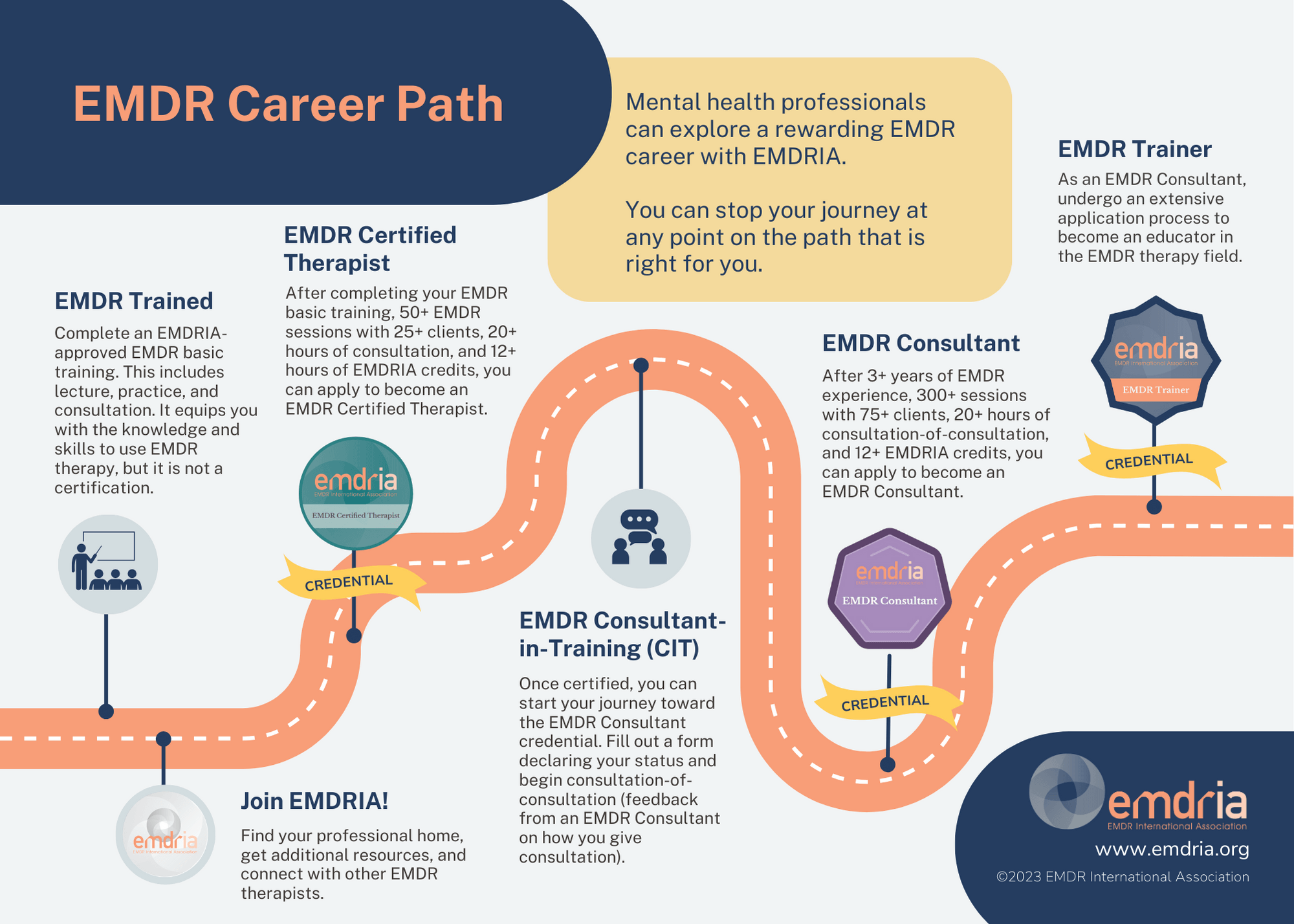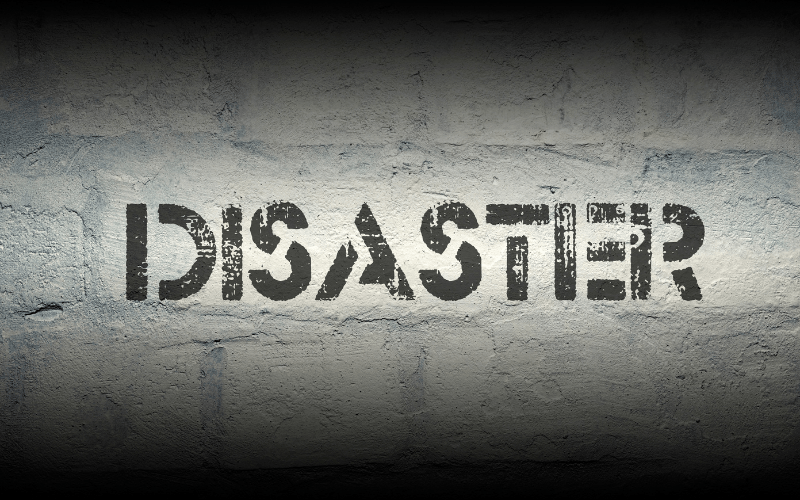At our most recent EMDR Consultant Day (March 24, 2023), there was a focus on four key areas related to consultation:
- IDEA (Inclusion, Diversity, Equity, Access) in EMDR Consultation
- Guiding Consultees in EMDR Case Conceptualization and Clinical Decision Making
- Challenges and Dilemmas for EMDR Consultants, and
- Assessing Fidelity During EMDR Consultation
Initially, the EMDR consultant day focused on general concepts of EMDR consultation. EMDR consultation is a collaborative relationship between mental health clinicians that aims to help consultees learn and solidify their knowledge, skills, and decision-making process regarding EMDR therapy. Consultation can be developed, sustained, and enhanced through education, thoughtful study, and training (Falender & Shafranke, 2020). EMDRIA Consultant Day had the goal of supporting EMDR Consultants and Consultants-in-Training (CIT) in their quest to become effective guides to their consultee’s learning process.
EMDR consultation is like teaching someone how to fly a kite. When flying a kite, there are some concrete steps to follow, but then you must adjust to keep the kite in the air despite ongoing circumstances such as a shift in wind direction or intensity. Clients are like kites who want to “fly” and reach their goals with the support and guidance of their therapist. The EMDR protocol provides steps to follow, and the Adaptive Information Processing (AIP) model provides principles to consider so that therapy can progress, and clients reach their therapeutic goals.
However, just like kite flying, therapists need to practice following the protocol and applying the AIP principles. Practicing will increase their skills to conceptualize cases and their tools to make clinical decisions to support clients in different situations such as an increase in emotions, intense body sensations, and/or dissociative symptoms. This kite analogy was used during Consultant Day; see the video here.
EMDR consultants are key to supporting consultees to reflect on the work done with clients, what worked, what did not work, and what adjustments can be or should be made in any of the phases of EMDR therapy to support clients.
An additional aspect to consider during the consultation is the importance of the therapeutic relationship so consultees can develop a relational approach to identify internal and external resources and explore traumatic events and disturbing life experiences that the client needs to reprocess. EMDR consultants help EMDR therapists to follow the steps of the protocol and apply the principles of the AIP model in the context of their relationship with their clients.
The IDEA panel (Layla Asamarai, Cheryl Kenn, Kriss Jarecki, Mark Nickerson, Yunetta Smith) tackled several important issues related to cultural humility, consultation via a decolonization/anti-racist lens, and what it means to be an EMDR consultant that practices IDEA. The panel began with a broad discussion about creating psychological safety for consultees and clients. As the session progressed, it became much more specific with how that safety might be achieved. The panel discussed some strategies for Broaching, a term that Day-Vines (2007) coined for the therapy profession that “refers to the counselor’s ability to consider the relationship of racial and cultural factors to the client’s presenting problem, especially because these issues might otherwise remain unexamined during the counseling process.” Broaching, use of language, and assessing therapists’ blocking beliefs were among some of the more specific topics addressed. The panel invited attendees to be intentional in their considerations of issues of inclusion, diversity, equity, and access in the EMDR consultation process.
In the day’s second presentation, Ana M. Gomez used metaphors to delineate how EMDR Consultants can help consultees improve their case conceptualization and clinical decision-making skills. For example, Gomez spoke of the “zoom in, zoom out camera” as a way for therapists to simultaneously hold what they know about a client with what is happening in the current moment. A sound in-the-moment clinical decision will be based both on the current context and the overall clinical “landscape” of the client. Gomez also considered viewing the eight phases in a circular way instead of a linear process and talked about ways to guide consultees when integrating EMDR with other modalities.
After lunch, another panel (Karen Alter-Reid, Bill Brislin, Mary French, Marlene Kenney, Sharon Rollins) tackled some important dilemmas and challenging situations facing EMDR Consultants. Some of the challenges discussed by the panel included strategies for helping consultees uncover the source of their hesitation to move into reprocessing, both in person and online. The role of the consultant as a “mentor” and “evaluator” was discussed with an emphasis on how to define competence and how to have conversations with consultees about their level of competence. Not surprisingly, issues pertaining to providing EMDR therapy via telehealth were discussed.
Consultant Day ended with a presentation by Jennifer Madere and Andrew Leeds concerning, “Assessing Fidelity During EMDR Consultation.” They discussed the importance of delineating fidelity scale policies into consultation standards and agreements.
If you are an EMDR Consultant or Consultant in Training and you could not attend Consultant Day, you can watch some of the presentations through our OnDemand Education platform here, and download the handouts for the day here. Make sure to sign in with your member information to access the platform. We hope EMDR Consultants with EMDRIA will join us for our next Consultant Day, which will be in person on August 24, 2023, in Arlington, Va., the day before our in-person Annual Conference.
References
Day‐Vines, N. L., Wood, S. M., Grothaus, T., Craigen, L., Holman, A., Dotson‐Blake, K., & Douglass, M. J. (2007). Broaching the subjects of race, ethnicity, and culture during the counseling process. Journal of Counseling & Development, 85(4), 401-409. https://doi.org/10.1002/j.1556-6678.2007.tb00608.x
EMDRIA. 2023 EMDR Consultant Day Handouts. https://www.emdria.org/2023-consultant-day-handouts/
Falender, C. A., & Shafranske, E. P. (Eds.). (2020). Consultation in psychology: A competency-based approach (pp. viii-344). American Psychological Association.
Back to Focal Point Blog Homepage
Additional Resources
If you are a therapist interested in the EMDR training:
- Learn more about EMDR at the EMDRIA Library
- Learn more about EMDR Training
- Search for an EMDR Training Provider
- Check out our EMDR Training FAQ
If you are EMDR trained:
- Check out EMDRIA’s Let’s Talk EMDR Podcast
- Check out the EMDRIA blog, Focal Point
- Learn more about EMDRIA membership
- Search for Continuing Education opportunities
If you are an EMDRIA Member:
Date
May 9, 2023





